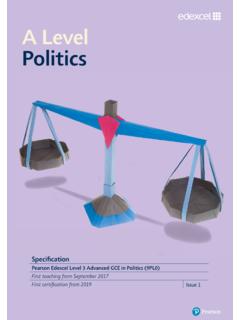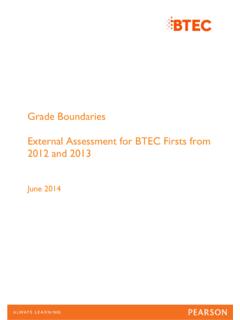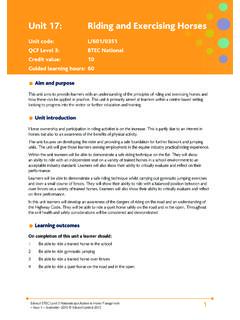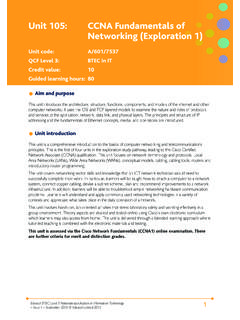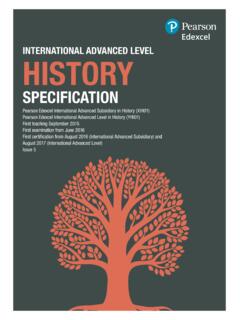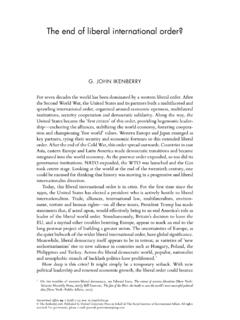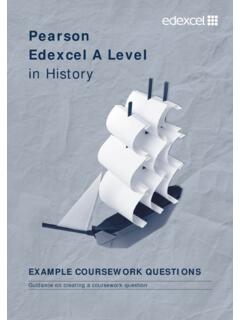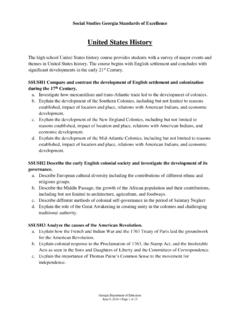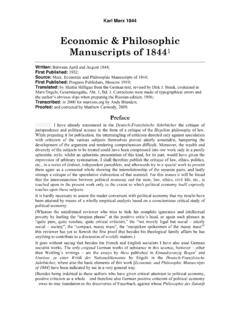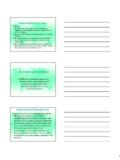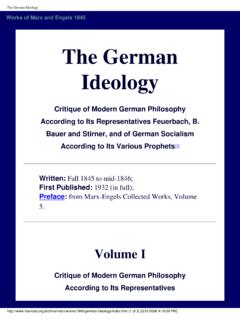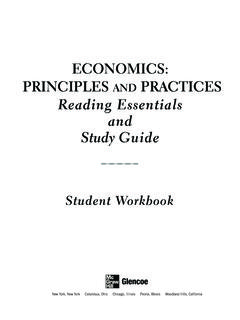Transcription of Pearson Edexcel iGCSE History Paper 1 Depth example ...
1 Pearson Edexcel International GCSE History Paper 1 Depth example answers April 2018 About this pack The example answers contained in this pack are indicative of the types of answers students may produce in response to the exam questions. They should not be seen as answers to emulate in order to guarantee a certain level of achievement. Pearson Edexcel International GCSE History Paper 1 Depth example answers 2 Paper 1 Depth : Germany: Development of a Dictatorship (a) What impression does the author give about Nazi policies regarding employment? You must use Extract C to explain your answer. (6) Answer A I think the author is giving the impression that the figures are being fiddled.
2 Examiner Comment The answer has identified an impression (that the Nazis tried to underplay the problem by not including certain sections of society). However, there is no selection of evidence to support this inference. The answer would be marked at Level 1 for a simple, valid comment. Answer B The author clearly thinks that the policies are not really successful. He gives the impression that the figures are not a true reflection of the real levels of unemployment. He is saying that unmarried men under 25 and women who have left work are not included in the figures. Examiner Comment The answer has identified an impression (that the Nazis tried to underplay the problem by not including certain sections of society).
3 It has then selected some material from the source to support the inference. However, it has not analysed the author s selection and treatment of the material so does not reach Level 3. The answer would be marked at Level 2 for a valid inference of impression with some support. Answer C The author gives the impression that the Nazi policies are not as successful as the Nazis are saying. You can see this in the language he uses as dubious or pushed into Labour Schemes . He also then chooses to list the ways in which the Nazis were able to report unemployment as lower than it actually was (dismissing women, saying part-timers were fully employed etc.)
4 So he has chosen to show just the negative side. The Nazis were actually very successful at boosting employment through rearmament and public works schemes but there is no mention of that. Examiner Comment The answer clearly explains the impression given (that the policies were not as successful as the Nazis claimed). It does this by looking at language used ( dubious , pushed into ) and the deliberate selection of only negative evidence in the passage. (the Pearson Edexcel International GCSE History Paper 1 Depth example answers 3 ways in which women were omitted from the figures, for example ) No positives, such as the impact of rearmament are given by the author.
5 The answer would be marked at Level 3 for explaining the impression, identifying treatment (language used) and the emphasis and selection of material by the author to support this impression. Pearson Edexcel International GCSE History Paper 1 Depth example answers 4 b) Explain two effects of hyperinflation on Germany. (8) Answer A Hyper-inflation came to Germany after the French occupied the Ruhr because the Germans had not been keeping up with their reparations payments. The German government decided that the way to make these payments was to print more money. By 1923 they had a lot of Paper mills who were doing nothing else except print money.
6 This led to a fall in the value of the mark and hyperinflation in Germany. Hyperinflation led to many Germans being forced into poverty. Examiner Comment The answer shows a misunderstanding of the demands of the question. What is required is an explanation of the effects of hyperinflation, whereas this answer is almost totally concerned with the causes. The only consideration of consequence is in the last line. The answer would be marked at Level 1 for generalised information about the topic, with a simple comment about consequence. Answer B One of the effects of hyperinflation was that many people lost their savings.
7 If you had been saving for many years and had managed to have a good sum of money, now you found that you didn t really! In January 1923 it cost 250 marks to buy a loaf. In November 1923 it cost over 200 billion marks. Prices had risen very steeply. Examiner Comment The answer explains a consequence of hyperinflation and provides some specific information to support the explanation. There is no explanation of the consequences of the steep rise in prices (ie the outcome of this feature of the period). Both of these elements of the answer, therefore are in Level 2. The answer would be marked at Level 2 and could not score more than 4 marks, because only one consequence has been addressed.
8 Answer C Hyperinflation in Germany was one of the reasons why the Weimar Republic was eventually overthrown. People blamed the government for signing Versailles and accepting the reparations terms. So, when Germany failed to keep up those payments and had to print money to make any payments, the resulting hyperinflation was blamed on the Weimar government. It wasn t overthrown immediately (though Hitler did try) because Stresemann was able to introduce measures which ended hyperinflation and restored stability. But when the Wall St. Crash came in 1929 and the economy collapsed again, many people remembered the economic chaos in the hyperinflation years and turned to more extreme parties, thus causing the Weimar Republic to fall .
9 Pearson Edexcel International GCSE History Paper 1 Depth example answers 5 Another consequence of hyperinflation was that prices rose very steeply in Germany. Money became so worthless that there were stories of people stealing handbags, keeping the bag and throwing the money away. It was even said that if you went for a meal in a restaurant, you should pay for the meal before you had eaten it, because prices would have gone up before you finished. Life must have been very difficult. Examiner Comment There are two separate consequence addressed in this answer. The first paragraph is a very well-constructed analysis of the consequences of hyperinflation in the longer term and how it led to the stated outcome (the fall of the Weimar Republic).
10 It is also supported with accurate and relevant information, showing a good knowledge and understanding of the characteristics of Nazi Germany. Both elements of the mark scheme in Level 3 can be seen clearly in the answer. However, the second paragraph provides much less accurate and relevant information and does not link this information to a stated outcome. This part of the answer is only Level 2. The answer would be marked at low Level 3, as it has one paragraph operating at Level 3 and one at Level 2. Pearson Edexcel International GCSE History Paper 1 Depth example answers 6 (c ) The Depression was the main reason that Hitler became Chancellor of Germany in January 1933.
